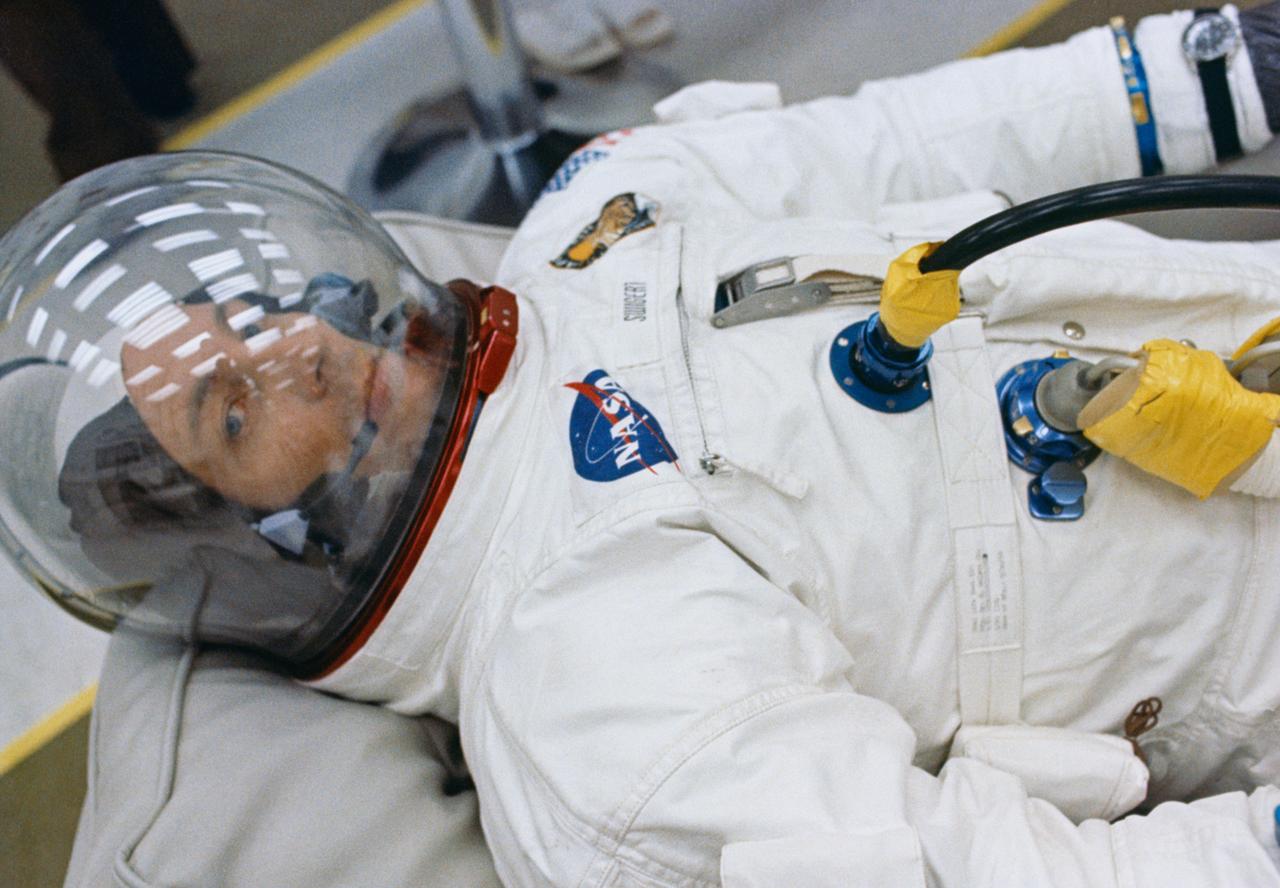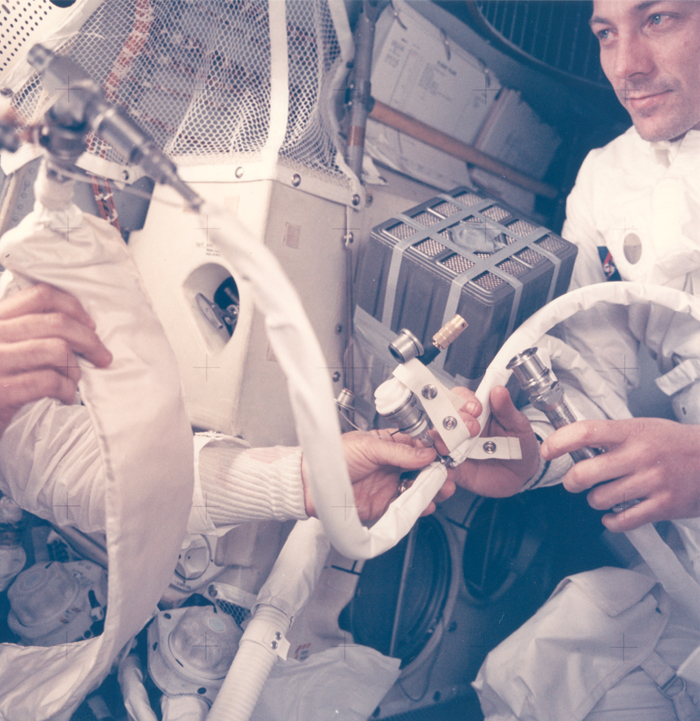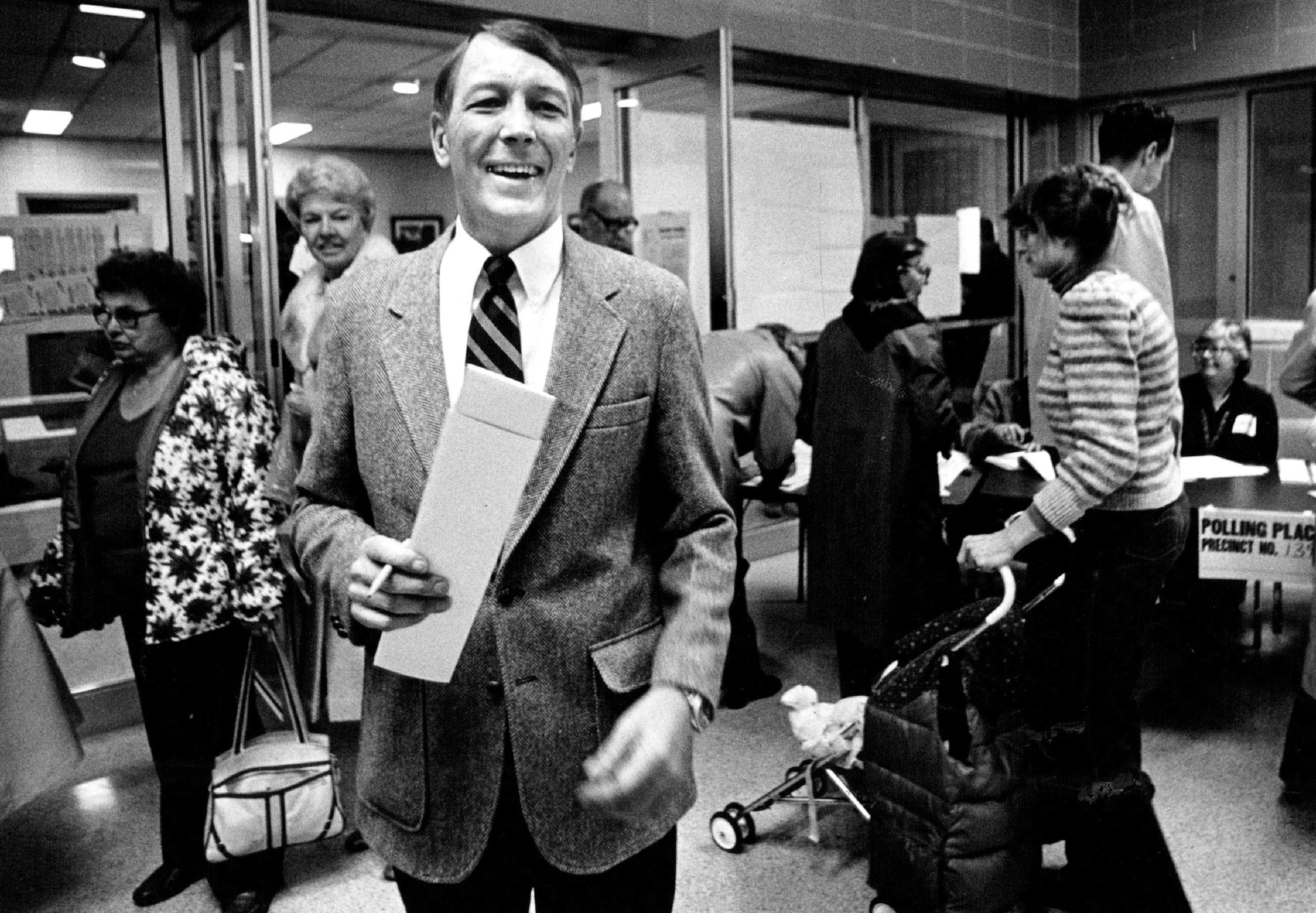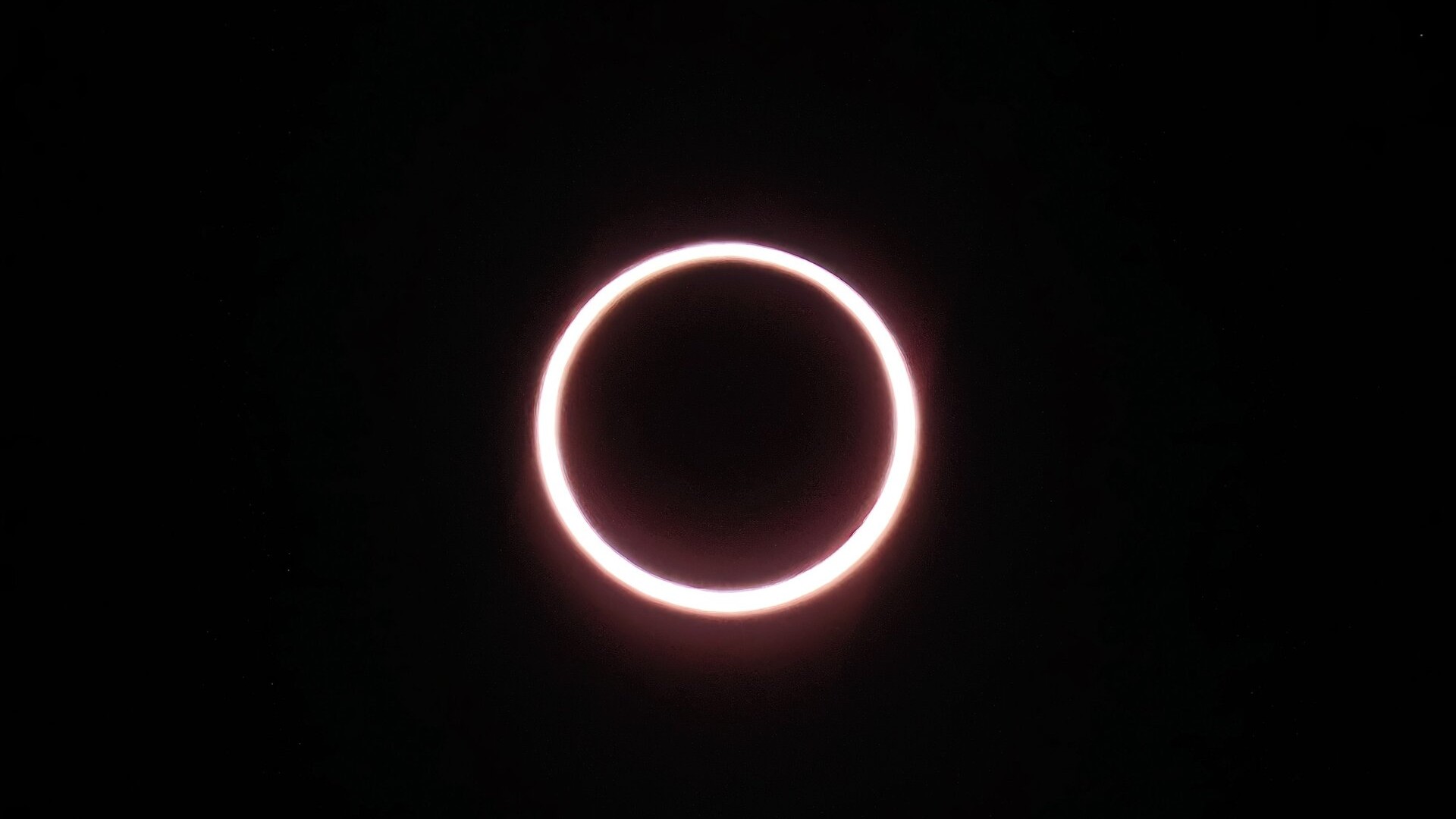Jack Swigert: Apollo 13 command module pilot
Jack Swigert survived the perilous Apollo 13 mission, then took a different kind of risk: entering politics.
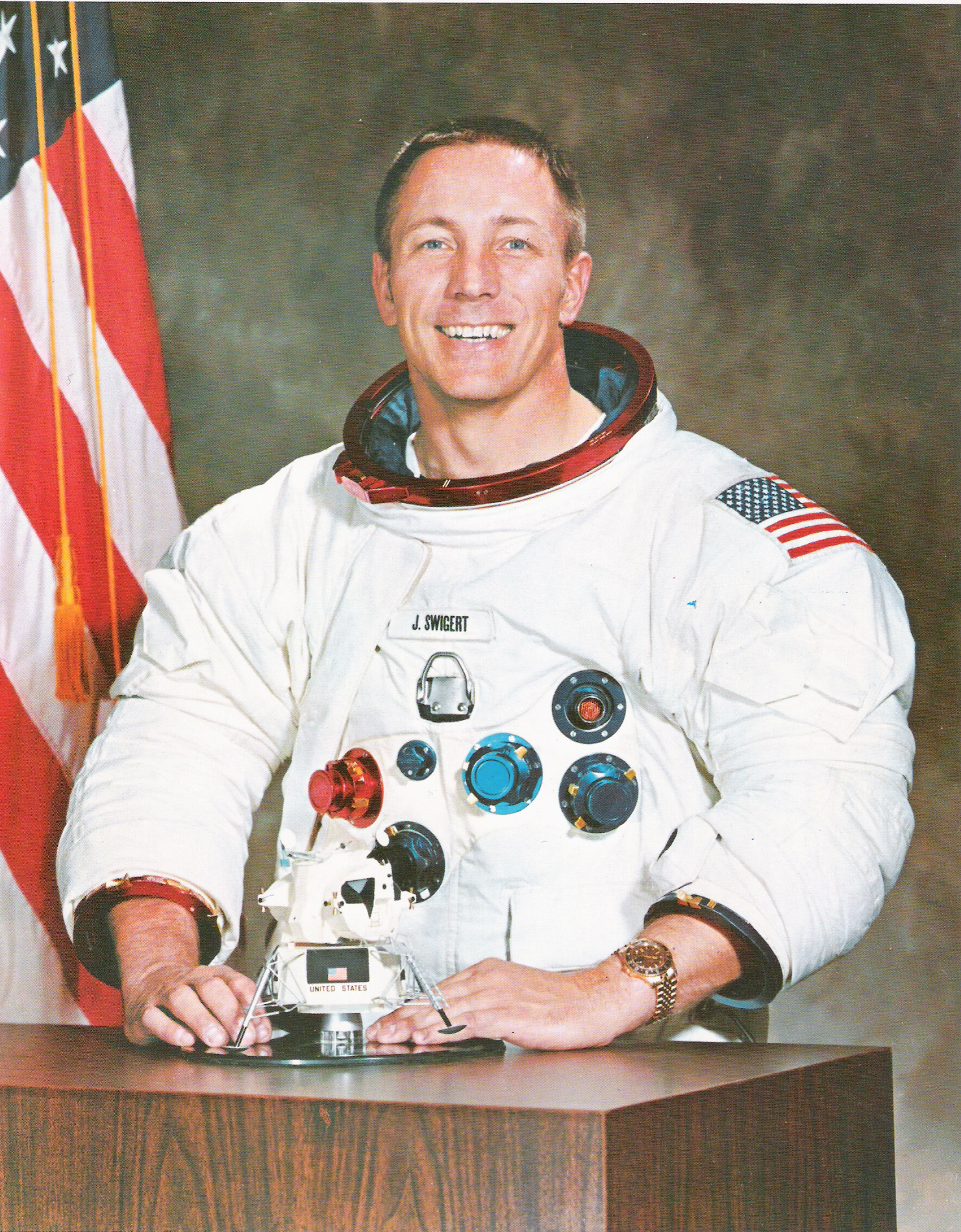
Breaking space news, the latest updates on rocket launches, skywatching events and more!
You are now subscribed
Your newsletter sign-up was successful
Want to add more newsletters?
John "Jack" Swigert was a test pilot, aerospace engineer, politician and NASA astronaut who was most famous for his role as the command module pilot of the ill-fated Apollo 13 mission in 1970. Swigert joined the Apollo 13 crew three days before launch time, after the original command module pilot, Ken Mattingly, was exposed to rubella.
Apollo 13 was NASA's third moon-landing mission, but an explosion in the command module forced the astronauts to abandon their dreams of visiting the moon and instead focus on making it back to Earth alive.
A few years later, Swigert resigned from NASA to enter politics. He won a seat in the U.S. House of Representatives representing Colorado in 1982, but died of bone cancer just before he could take office.
Becoming an astronaut
Swigert was born in Denver, Colorado on Aug. 30, 1931. He became interested in aviation as a teenager and earned his pilot's license at age 16, according to America Space. Swigert attended the University of Colorado, where he played on the school's football team. He graduated in 1953 with a bachelor's degree in mechanical engineering.
After college, he joined the U.S. Air Force and served as a fighter pilot in Japan and Korea. He then served several years as a pilot with the Massachusetts Air National Guard and the Connecticut Air National Guard before becoming a test pilot for aerospace company Pratt & Whitney.
Related: More than 12,000 apply to become an astronaut for NASA's 'Artemis Generation'
Swigert applied for NASA's astronaut program and was rejected twice before he was accepted as part of the agency's fifth class of astronauts in 1966, along with future Apollo 13 crewmate Fred Haise. "I'm a fighter, not a quitter. Look what I did to get into the space program," Swigert said, many years later.
Breaking space news, the latest updates on rocket launches, skywatching events and more!
Unlike most of his astronaut colleagues, Swigert was single and had the reputation of being a playboy who liked to party. But his talent and skill as a pilot made it easy for his colleagues to ignore his promiscuous personal life, according to "Falling to Earth" (Smithsonian Books, 2015), written by fellow astronaut Al Worden and space writer Francis French. After the Apollo 1 fire in 1967, Worden and Swigert were assigned to help work on improving the Apollo command module spacecraft. Both astronauts later served as command module pilots.
Apollo 13
Apollo 13 was Swigert's first trip to space, at age 38. He had been part of the support crew for Apollo 7 in 1968, and was initially Apollo 13's backup command module pilot. He was asked to join the crew three days before launch time after the original command module pilot, Ken Mattingly, was exposed to rubella. It was a contentious decision, and mission commander Jim Lovell wasn't in support of the change at first.
"[Swigert] knew the command module pretty good. He — it is true — he had not trained for the last month and a half because normally the backup crew at that stage are the gofers," Lovell said in a 1999 interview with NASA. Once Swigert had a few days to train with Lovell and Haise, however, Lovell had praise for Swigert's work. "Jack proved out to be a very, very competent pilot," Lovell said.
It was a whirlwind few days for Swigert, who soon found himself aboard a spacecraft speeding away from Earth. But there was one important thing he had forgotten to do before leaving home: his income taxes.
Related: Tax Day in space: How NASA astronauts pay Uncle Sam
"How do I apply for an extension?" he asked from space to those in Mission Control, who began to laugh. "Things kind of happened real fast down there and I need an extension. I'm really serious."
Flight director Glynn Lunney later reassured the astronaut: American citizens who were out of the country received a 60-day filing extension. "I assume this applies," he told the astronaut, who was already far from the planet at that time.
Apollo 13 was NASA's third moon-landing mission, but the astronauts never made it to the lunar surface. An oxygen tank explosion almost 56 hours into the flight shook the spacecraft, and the crew notified Mission Control, with Swigert famously saying, "Okay, Houston, we've had a problem here."
Related: Failure was not an option: NASA's Apollo 13 mission of survival in pictures
The accident meant the moon landing was canceled, and the crew shifted their priority to returning home as safe and as fast as possible. Fortunately, the crew were able to leave the command module and seek cramped shelter in the lunar module for most of the trip back to Earth, before scrambling back to the frigid command module for an uncomfortable splashdown.
From space to politics
Swigert was then assigned to fly on the 1975 Apollo-Soyuz Test Project mission, but was removed from the docket and any future spaceflights, after the Apollo 15 stamp collector controversy surfaced. Swigert initially denied involvement, but later admitted to his dealings with a private collector who was paying astronauts to carry stamps into space.
In 1973, Swigert took a leave of absence from NASA to become executive director of the committee on science and technology for the U.S. House of Representatives. Swigert then resigned from NASA and the committee in 1977 to make a run for the U.S. Senate. He lost in the Republican primary to Bill Armstrong, and then became vice-president of B.D.M. Corp. in Colorado in 1979.
Related: NASA's moonwalking astronauts: Where are they now?
Always a fighter, Swigert tried again, this time for a U.S. House seat to represent his home state of Colorado. He began campaigning for the Republican nomination for Colorado's 6th District, and easily secured it. However, Swigert was diagnosed with bone marrow cancer during his run.
"There are thousands of people out there that believe in me and we're just going to go ahead and win this campaign. That's all there is to it," said Swigert in a press conference announcing his illness.
Swigert was convinced he could beat the cancer because it was initially diagnosed as an easily treatable lymphoma, reported the Bangor Daily News. In the days following, however, doctors realized it was a carcinoma and told him it had already spread into his lungs. Weeks after Swigert won the election in November, he died of respiratory failure on Dec. 28, 1982, just days before he would have been sworn in to Congress, at the age of 51.
Swigert's legacy
Swigert was honored with numerous awards throughout his career, including the Presidential Medal of Freedom and medals from the cities of New York and Houston. He received three honorary doctorate degrees in 1970, from American International College, Western State University and Western Michigan University.
In 1983, Swigert and 14 other Apollo astronauts were inducted into the International Space Hall of Fame, and in 1997 he was posthumously inducted into the U.S. Astronaut Hall of Fame with 23 other Apollo astronauts.
Swigert was portrayed by actor Kevin Bacon in the 1995 film "Apollo 13," based on the book by Lovell and journalist Jeffrey Kluger called "Lost Moon: The Perilous Voyage of Apollo 13" (Houghton Mifflin, 1994). The movie won two Academy Awards.
Related: Apollo 13 in Real Time website offers new insight into mission, 50 years later
The State of Colorado commissioned a statue of Swigert in his astronaut suit, made by George and Mark Lundeen, which is now on display in Emancipation Hall in the United States Capitol Visitor Center. A replica of the statue is on display at the Denver International Airport.
Swigert's legacy also lives on through the Space Foundation, an organization founded in 1983 that helps fund and promote contributions to space exploration in honor of Swigert. In 2009, the Space Foundation partnered with a Colorado Springs school district to open the Jack Swigert Aerospace Academy.
This year marks the 50th anniversary of the Apollo 13 mission. Keep checking in with Space.com for updates about Apollo 13 events and celebrations around the world.
Additional resources:
- Check out the impressive statue of Swigert in the U.S. Capitol Visitor center in this video.
- Watch this April 15, 1970 video interview with Swigert's dad, Dr. Swigert, from the Associated Press archives.
- Read more about the Apollo 13 mission and other Apollo missions from the Smithsonian Air and Space Museum.

Elizabeth Howell (she/her), Ph.D., was a staff writer in the spaceflight channel between 2022 and 2024 specializing in Canadian space news. She was contributing writer for Space.com for 10 years from 2012 to 2024. Elizabeth's reporting includes multiple exclusives with the White House, leading world coverage about a lost-and-found space tomato on the International Space Station, witnessing five human spaceflight launches on two continents, flying parabolic, working inside a spacesuit, and participating in a simulated Mars mission. Her latest book, "Why Am I Taller?" (ECW Press, 2022) is co-written with astronaut Dave Williams.
